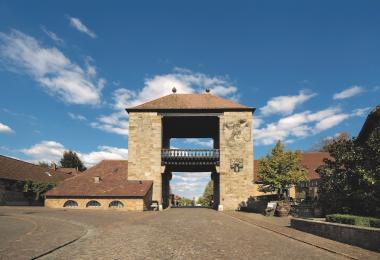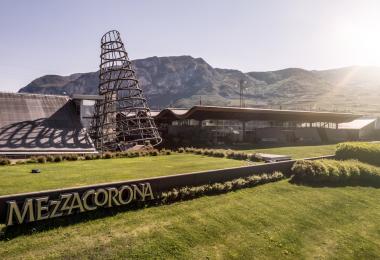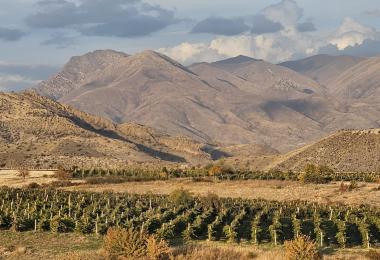The rosé explosion of the past few years has focused almost exclusively on colour, as consumers have gone crazy for the classic pale pink wines from the South of France. Winemakers around the world have raced to copy the colour.
But all too many of these wines lack a crucial dimension of wine – the aroma.
When a wine is enjoyed as an aperitif without food, as rosé so often is, the aroma becomes more important than usual. And this is where many rosés disappoint, because all the work has gone into the colour, not the flavours and aromas.
Enter Val Soléu, a ground-breaking rosé that offers a full array of aromas and flavours – plus the colour consumers love so much.
The country of perfume
Val Soléu originates from the south of the Rhône Valley, in a place called Drôme Provençale. “It’s where the Alps end, just between the Alps and the Mediterranean,” says James Fuselier from Cellier des Dauphins, the winery behind the wine. “When you come out from this valley, it opens onto the sun.”
The wine is called Val Soléu because “it means ‘valley of the sun’ in Provençal dialect,” he explains.
The grapes come from a valley in the heart of the region, which is traversed by the river Eygues, which descends from the mountains. The vines, situated at altitude, are swept by both the Mistral and Lou Pontias winds, keeping them clean and healthy.
“Locally, they call this small region the country of taste and perfume,” says Fuselier. The great aromatic diversity comes from the region’s numerous vines, apricot and peach trees, olive trees, lavender bushes, aromatic herbs and truffle oaks. “We chose this terroir, because from the beginning we wanted the wine to be a naturally aromatic experience,” he goes on.
The parcels are selected from grapes grown at altitude, with particular emphasis on Grenache and Cinsault. To capture the maximum aromas, they are picked at dawn. “This is what they call the ‘peak of thiols’ hour, because it’s a time when the concentration of aromatic compounds reaches its maximum,” says Fuselier.
The grapes are pressed immediately and then kept for two weeks on fine lees, to preserve the natural aromas and flavours. The result is an elegant rosé made without added sugar, which delivers attractive aromas and a balanced palate. “It’s also fresh,” says Fuselier. “It’s about conviviality, summer and being together.”
Introducing Cellier des Dauphins
It’s no surprise that such a wine comes from Cellier des Dauphins. Founded in 1965, it consists of a co-operative group of winegrowers families from 11 villages around the Eygues and the Ouvèze valleys across an area that extends from Sérignan-du-Comtat in the south to Nyons, at the foot of the Alps. Within the protected Côtes du Rhône area of production are 20 Villages appellations, including Plan de Dieu, Puyméras and Valréas.
It’s also one of France’s most innovative wineries. One reason is because the winemaker and the winegrower are always on the same team and work closely together, the key to getting the best results from the vineyards. This means Cellier des Dauphins has plenty of premium grapes to draw on – the group is far and away the biggest producer of organic wines in the Rhône Valley – which they have used to launch many successful brands, including the blockbuster Les Dauphins.
And now comes Val Soléu, the naturally aromatic rosé.
If you would like to know more, or taste the wine, visit www.cellier-des-dauphins.com to find the correct partner. The wines are now available in France, Germany and the USA.








